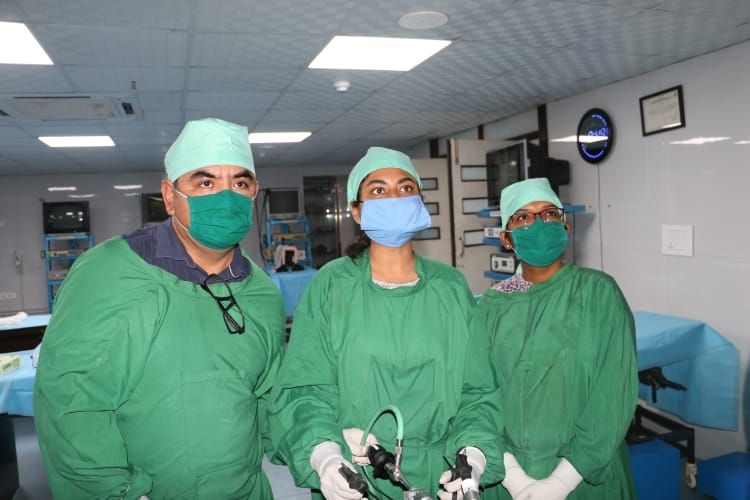Event Date: Sat - 11 Nov, 2023
Event Time: 9:10 am
Location: World Laparoscopy Hospital
Institute: WLH
In the gynecological laparoscopic wet lab, gynecologists undergo training that involves practicing live tissue surgeries to refine their skills in various procedures such as tubal sterilization, salpingostomy, ovarian drilling, and hysterectomy. This hands-on experience in a realistic setting is invaluable for surgeons-in-training as it allows them to navigate the intricacies of female reproductive anatomy. During laparoscopy training on live tissue, gynecologists develop a heightened tactile sensitivity and spatial awareness, essential for performing precise and minimally invasive surgeries. The dynamic nature of live tissue enables trainees to adapt to variations in anatomy and tissue characteristics, preparing them for the complexities they may encounter in real surgical scenarios. While live tissue training is highly effective, ethical considerations are paramount. As a result, there is a growing exploration of alternative methods, including the use of cadaveric models and virtual reality simulations, to strike a balance between effective education and ethical concerns. These alternatives offer a controlled environment for skill development without the ethical implications associated with live tissue use, ensuring that gynecologists are well-prepared for the challenges of modern surgical practice. In the gynecological laparoscopic wet lab, gynecologists engage in live tissue surgeries to enhance their proficiency in key procedures like tubal sterilization, salpingostomy, ovarian drilling, and hysterectomy. This immersive training provides a realistic platform for surgeons to develop precision, dexterity, and a nuanced understanding of the unique challenges posed by female reproductive anatomy. Laparoscopy training on live tissue fosters adaptability, allowing gynecologists to hone their techniques in response to variations in tissue textures and anatomical structures. The hands-on experience aids in refining skills crucial for performing intricate surgeries with minimal invasiveness, aligning with the evolving standards of modern surgical practice. Despite the effectiveness of live tissue training, ethical considerations have led to the exploration of alternative methods. Cadaveric models and virtual reality simulations offer controlled environments for skill development, addressing ethical concerns while ensuring that gynecologists receive comprehensive training to excel in the dynamic field of laparoscopic gynecological surgery.World Laparoscopy Hospital: A Hub of Contemporary Learning with Daily 8-Hour Hands-On Laparoscopic Training
In the realm of medical education and training, there are institutions that stand out as pioneers, constantly pushing the boundaries of what is possible. One such institution is the World Laparoscopy Hospital, where a contemporary event unfolds every day, featuring a remarkable 8-hour hands-on laparoscopic training program.
A Daily Revolution in Learning
At the heart of the World Laparoscopy Hospital's mission is the commitment to train the next generation of surgeons and medical professionals in the art and science of Minimal Access Surgery. What makes this institution truly exceptional is its daily 8-hour hands-on laparoscopic training program.
The Laparoscopic Revolution
Laparoscopic surgery, often referred to as minimally invasive surgery, has revolutionized the field of surgery in recent decades. Instead of large incisions, this technique involves making tiny keyhole-like openings through which a camera and surgical instruments are inserted. This results in significantly reduced patient trauma, shorter recovery times, and less post-operative pain.
The Daily Experience at World Laparoscopy Hospital
Every day at World Laparoscopy Hospital is a contemporary event in the world of medical education. Here's a glimpse into what a typical day looks like for those fortunate enough to train at this prestigious institution:
1. Intensive Training: The 8-hour hands-on laparoscopic training is an immersive experience where trainees work side by side with experienced surgeons. This hands-on approach ensures that students gain practical skills and confidence in performing laparoscopic procedures.
2. State-of-the-Art Facilities: The hospital boasts state-of-the-art facilities, equipped with the latest laparoscopic instruments and technology. Trainees have access to the same tools and equipment used in modern surgical practices around the world.
3. Expert Faculty: The training is conducted under the guidance of expert faculty members who are pioneers in the field of Minimal Access Surgery. Their wealth of knowledge and experience provides students with invaluable insights and mentorship.
4. Customized Curriculum: The training program is tailored to the specific needs and experience levels of each student. Whether you are a novice or an experienced surgeon looking to refine your skills, there is a program to suit your requirements.
5. Global Reach: World Laparoscopy Hospital attracts medical professionals from all corners of the world. This diverse group of trainees fosters cross-cultural exchanges and collaborations, enriching the learning experience.
6. Research Opportunities: Beyond the hands-on training, the hospital also serves as a hub for research and innovation in the field of Minimal Access Surgery. Trainees have the opportunity to participate in cutting-edge research projects.
Impact Beyond the Classroom
The impact of the daily 8-hour hands-on laparoscopic training at World Laparoscopy Hospital extends far beyond the classroom. Graduates of this program return to their respective countries armed with advanced skills, contributing to the global dissemination of minimally invasive surgical techniques. Patients around the world benefit from the reduced invasiveness, faster recoveries, and improved outcomes that these skilled professionals bring to their practice.
In conclusion, World Laparoscopy Hospital's commitment to daily 8-hour hands-on laparoscopic training is a testament to its dedication to excellence in medical education. By offering a world-class learning environment and fostering a culture of innovation, this institution is shaping the future of surgery, one trainee at a time. It is not just an institution; it is a beacon of hope for patients and a driving force in advancing the field of surgery.


